Home remedy: Doctor’s office in Camden high rise is an ER alternative
Listen-
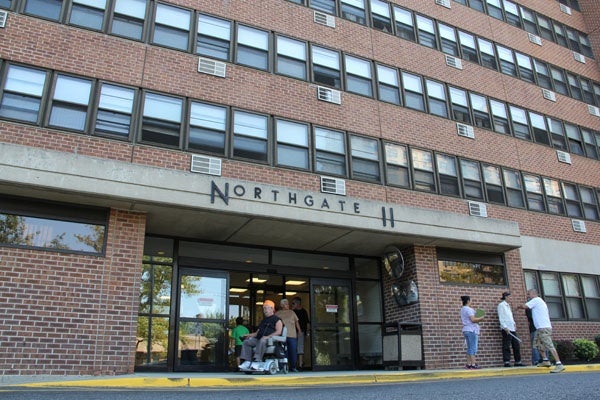
-
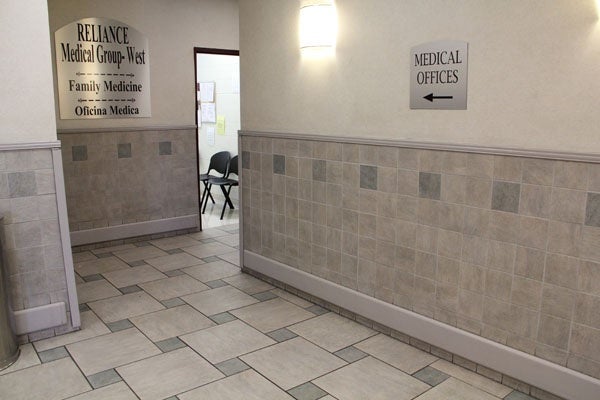
-
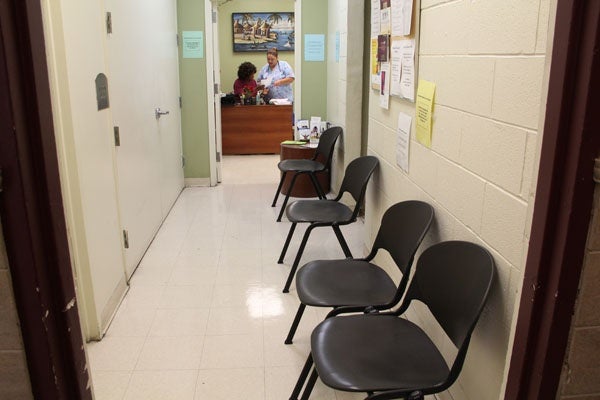
-
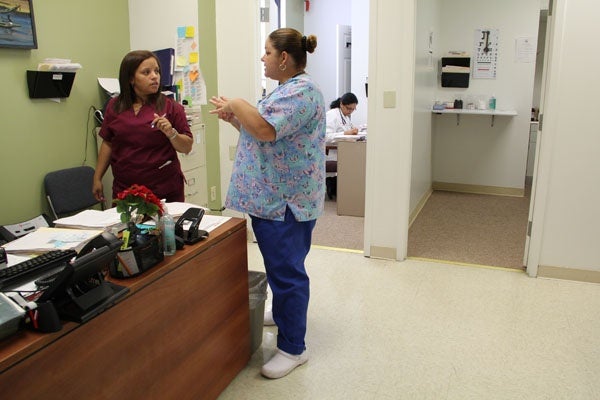
-
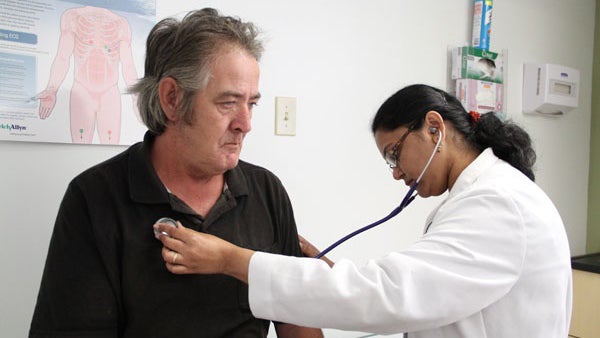
Dr. Madhumathi Gunasekarn examines John Pike at the Northgate II clinic in Camden. Pike is one of about 100 residents of the apartment complex who have visited the medical office. (Emma Lee/for NewsWorks)
-
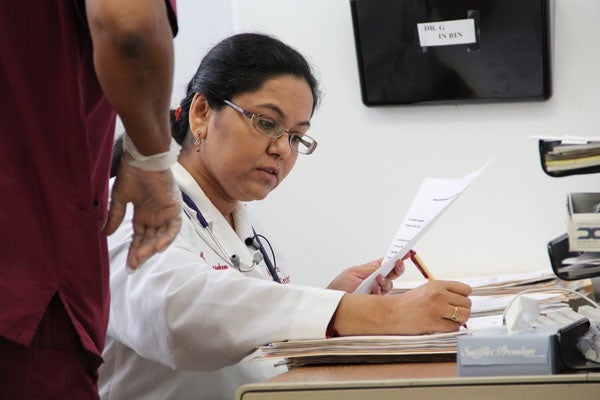
-
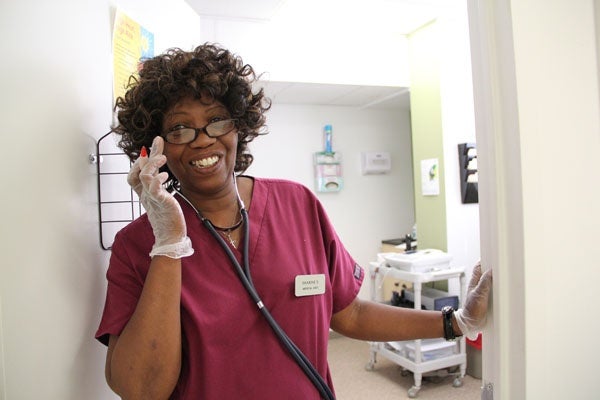
-
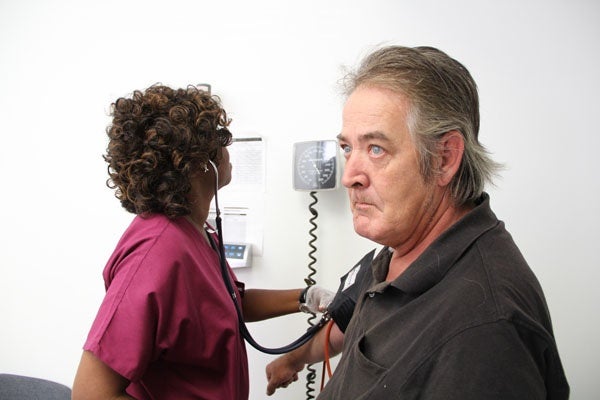
Residents of one Camden, N.J., high-rise — Northgate II — now have a new health-care option, a doctor’s office in the ground floor of the building.
Miss an important appointment, and medical assistant Sharine Eliza might come looking for you, or send someone from building security to knock on your door.
“I’m a little bit of everything here,” Eliza said. “Trying to make the connection, to try to fix whatever it is for the patients.”
That personal attention seems to be heart of the new medical practice.
“Patients say, ‘You need to go see Sharine. You know we have the doctor downstairs, just go see Sharine,'” Eliza said.
The office is bare bones, just two exam rooms and a tiny file office. The goal is to get more residents to take the two-minute elevator ride for consistent care closer to home instead of calling 911.
A doctor sees patients on Tuesdays and Thursdays, but Eliza’s there five-days a week to answer questions and help smooth out health-insurance snags.
“People assume that she doesn’t speak Spanish when they go in,” said Pam Robb, president of the tenants association. “They look at her, they’ll be speaking Spanish and she’ll smile, and she’ll speak Spanish. And they are like: ‘Oh! Comprende?’ And to see the joy in their faces. She understands.”
A representative from the building’s social services department estimates that 60 to 80 percent of Northgate II’s residents are Hispanic.
Relying on hospitals for primary care
Several years ago, researchers from the Camden Coalition of Healthcare Providers discovered that the building’s residents rack up over $1 million in emergency room visits and hospital admissions each year.
“That’s a sign for us, from the data, that you don’t have a source of primary care, or you have a loose relationship with primary care or you can’t get an appointment with your primary care because of your work hours,” said Ken Gross, the coalition’s director of research and evaluation.
The coalition is probably best known for culling billing information from Camden’s three hospitals to better understand citywide health-care problems. The coalition’s health data detectives are experts in “hotspotting,” using information to illustrate geographically where medical use and costs are distributed.
“Patients could go to Cooper for three visits, or Lady of Lourdes for one visit and Virtua for another visit, and if you only got data from Cooper you’d only know that that person went three times,” Gross said.
As the researchers were poring over the data for Camden, the Northgate II’s address —500 N. 7th Street — surfaced over and over.
The coalition develops programs to improve health and lower costs across the city, and the medical office at Northgate II is its most ambitious experiment yet.
The 23-floor high rise is subsidized housing for low-income seniors and people with disabilities, so you might expect there to be more illness, or more people who need to see a doctor. Still, Gross said there’s a strikingly high number of trips between Northgate II and city emergency rooms.
“That means there’s a lot of dollars hanging out there,” Gross said. “That means if we can only reduce it by 10 percent, that’s 10 percent of a lot of dollars.”
Cutting down on ER visits
Each year between 2002 and 2011, about half of the residents of Northgate II visited a city emergency room or ended up in a hospital bed, and each of those residents averaged over two trips to the hospital.
Much of Northgate’s ER and hospital expenses go toward ambulance rides and care for everyday ailments, and a hospital ER can charge the government and insurance companies hundreds of dollars to check out sniffles or a stomachache. That’s the costly problem that led to the new doctor’s office and medical assistant Sharine Eliza.
She’s one part of an effort to get the building’s “super users” to stop going to the hospital so much. To help figure out how to do that, the coalition held community meetings and spoke with residents at Northgate II.
Fifty-three-year old John Pike had a hip replacement back in 2007, but he’s still in pain, and for years, he was a frequent flier in the emergency department.
“You sit there and wait, you can be there for sometimes four hours, almost all day,” Pike said.
Pike guesses that he used to visit the ER eight or nine times a year, but that didn’t necessarily make him feel welcome. Staffers change all the time, he said, and no one seemed to remember him or his medical history.
“You get to feeling you are irritating them,” Pike said. “Cause it would be a simple problems, I’m wasting their time where they could be dealing with a real emergency.”
During one trip to the ER, Pike says a nurse pulled him aside, and told him, “This is something your doctor can deal with.”
Pike said he tried to find a family physician but none of the doctor’s offices he called, called him back. Then about a year ago, the Northgate practice opened.
Emphasizing prevention, self-management
Today Madhumathi Gunasekaran is Pike’s primary care physician. Most of her patients call her Dr. G.
“I feel comfortable with her, I can talk to her, she doesn’t shove you off like some doctors,” Pike said.
Gunasekaran said she believes strongly that prevention is better than cure, and as part of her care, she gently nags Pike to quit smoking. She also suggested an at-home monitoring device to make sure he’s taking his blood thinner medication correctly.
Taking time to have conversations about exercise, eating right and taking medications regularly are all part of Gunasekaran’s efforts to steer building resident toward better self-management and away from costly emergency care.
Pike selected Gunasekaran as his doctor soon after the Reliance Medical Group opened the practice, but many others in the building have been tougher to convert.
Mark DiFilippo, associate director of behavioral health at the coalition, said people turn to — and stick with — the ER for lots of reasons. For example, some doctor’s offices in Camden aren’t accepting new patients, he said.
“Some are just so busy it’s hard to even get somebody on the phone to schedule a visit,” DiFilippo said. “Some you show up and you sit a couple hours before you see somebody, some you go and you have 15 minutes to talk about everything that’s going on with you.”
DiFilippo and his health coaches work with clients in the building, and he says some tenants are simply comfortable doing things the way they’ve always done them.
“Their culture is that we go to the emergency room. ‘My mom did, my grand mom did, so that’s what I do.’ So one of the things we are trying to educate people on, is when you should approach a primary care provider and when you should go to the emergency room, and that’s a big job,” DiFilippo said.
Overcoming resistance to change
Even with the new medical practice open on the ground floor, change is hard and often slow. Just putting in the doctor’s office didn’t do the trick.
“We thought since they were having such a difficult time, that we would just open the door and they would come down, that wasn’t the case,” said Dr. Jon Regis. “They have to really get to know you, trust you.”
Regis is president of Reliance Medical Group, which runs the practice at Northgate II. So far only about 90 of the building’s 360 residents have come in for an appointment.
Gross said the “stickiness” of those visits is promising because more than half of the patients are repeat customers. The medical practice at Northgate II has been open about a year. And the researchers at the Camden Coalition say it’s too soon to know if resident hospitalizations and ER visits have decreased.
It’s taken more than health care to woo patients. Reliance holds a meet-the-doctor coffee klatsch once a month, and the team has tried to sell the practice with posters and pens, magnets and water bottles, free health screenings and house calls.
Location is a big selling point but also complicates patient confidentiality. Regis said some people don’t want their neighbors to know they’re going to the doctor.
“That was somewhat surprising. We’re starting to get past that now,” he said.
Balancing the books
Many Northgate residents are in the Medicaid program, which is notorious for its stingy payments to doctors. The goal is to get about 15 percent of building residents to choose Reliance as their medical home for regular care and checkups.
Regis said he’s not counting on the Northgate II site alone to balance the books. Reliance has more than 20 other physician offices, and Regis says he’ll keep the Northgate location open by blending revenue from other sites where there are more patients with private insurance and Medicare.
“Health care is a business, a special business, but a business,” Regis said. “One and one is two no matter where you are.”
The office is careful to keep expenses low, but Regis said Reliance does handpick — and invest in — staffers such as Sharine Eliza who understand the power of “friendly.”
“If you have a doc that’s not really listening to you, if he’s always writing, and trying to get you out of the room, it doesn’t really have the anointing to do what he’s doing,” Regis said. “You need to find another doctor.”
WHYY is your source for fact-based, in-depth journalism and information. As a nonprofit organization, we rely on financial support from readers like you. Please give today.



